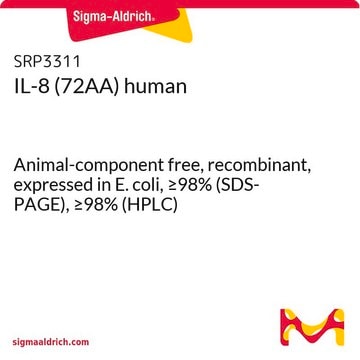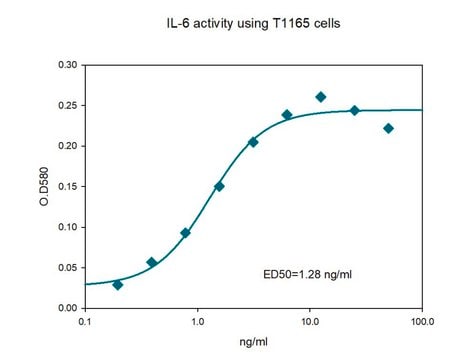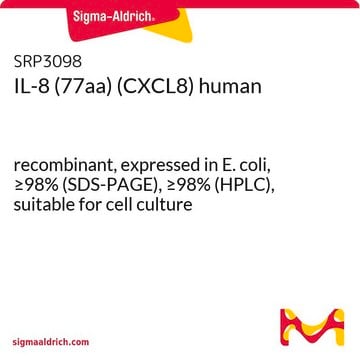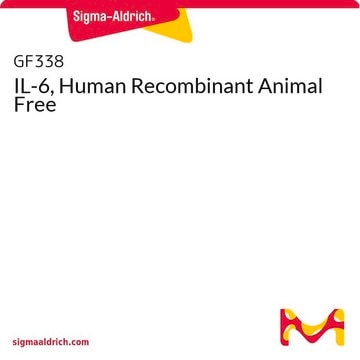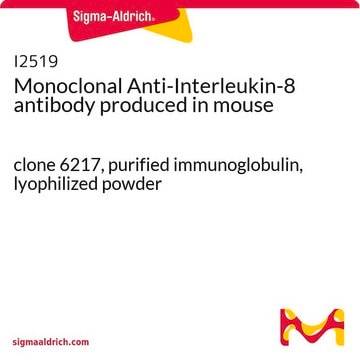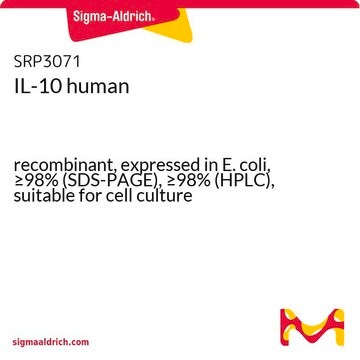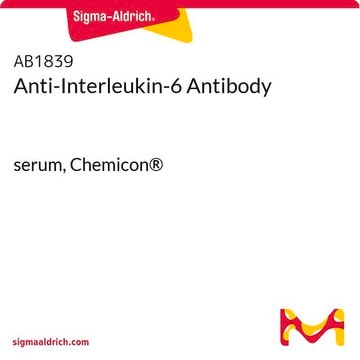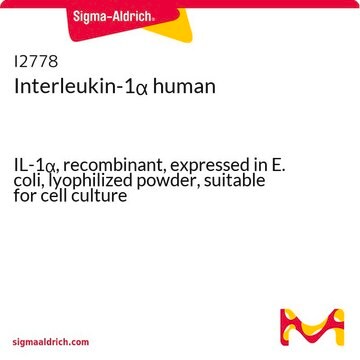I1645
Interleukin-8 human
≥98% (SDS-PAGE and HPLC), recombinant, expressed in E. coli, lyophilized powder, suitable for cell culture
Synonym(s):
IL-8
Sign Into View Organizational & Contract Pricing
All Photos(1)
About This Item
Recommended Products
biological source
human
Quality Level
recombinant
expressed in E. coli
Assay
≥98% (SDS-PAGE and HPLC)
form
lyophilized powder
mol wt
8.4 kDa
packaging
pkg of 10 μg
technique(s)
cell culture | mammalian: suitable
impurities
endotoxin, tested
UniProt accession no.
storage temp.
−20°C
Gene Information
human ... IL8(3576)
Application
Interleukin-8 (IL-8) human has ben used to:
- measure neutrophil chemotoxis
- study the uptake of apoptotic cells by meningothelial cells
- study the effect of IL-8 on expression and secretion of urocortin-1 by human umbilical vein endothelial cells
Biochem/physiol Actions
Interleukin-8 (IL-8) was formerly called monocyte-derived neutrophil chemotactic factor. It belongs to the chemokine α or C-X-C family. Like other members of this family, the mature form of IL-8 has four cysteine residues and the first two cysteine residues are separated by glutamine. IL-8 shows chemotactic activity in vitro for T cells, neutrophils and basophils. Mutation in IL-8 can increase risk to acute pancreatitis.
Interleukin-8 (IL-8), formerly called monocyte-derived neutrophil chemotactic factor, belongs to the chemokine α or C-X-C family. The mature form of IL-8 has 4 cysteine residues, as do the other members of the chemokine family and the first two cysteine residues are separated by glutamine. Mature human IL-8 consists of 72 amino acids with a molecular mass of 8.4 kDa. IL-8 exhibits chemotactic activity in vitro for T cells, basophils, as measured by enzymes including myeloperoxidase, α-mannosidase and β-glucuronidase. IL-8 is an angiogenic factor.
Physical form
Lyophilized from a 0.2 μm filtered solution with no additives.
Analysis Note
The biological activity is determined by its ability to chemoattract human peripheral blood neutrophils using a concentration range of 10.0-100.0 ng/ml.
Storage Class Code
11 - Combustible Solids
WGK
WGK 3
Flash Point(F)
Not applicable
Flash Point(C)
Not applicable
Personal Protective Equipment
dust mask type N95 (US), Eyeshields, Gloves
Choose from one of the most recent versions:
Already Own This Product?
Find documentation for the products that you have recently purchased in the Document Library.
Customers Also Viewed
X B Bao et al.
Genetics and molecular research : GMR, 14(1), 1508-1514 (2015-03-03)
We conducted a case-control study to clarify the asso-ciations between inflammatory cytokine, including interleukin (IL)-1b, IL-6, IL-8, and IL-10, polymorphisms and risk of acute pancreatitis. Genotyping analyses of IL-1β+3954 C/T (rs1143634), IL-1β-511 C/T (rs16944), IL-6 -174 G/C (rs1800795), IL-6 -634
D E Graugnard et al.
Journal of dairy science, 95(4), 1749-1758 (2012-03-31)
Cows experience some degree of negative energy balance and immunosuppression around parturition, making them vulnerable to metabolic and infectious diseases. The effect of prepartum feeding of diets to meet (control, 1.34 Mcal/kg of dry matter) or exceed (overfed, 1.62 Mcal/kg
Hyesol Lim et al.
Journal of cellular physiology, 236(10), 7014-7032 (2021-03-23)
Cancer-associated fibroblasts (CAFs) in the tumor microenvironment have been associated with tumor progression in breast cancer. Although crosstalk between breast cancer cells and CAFs has been studied, the effect of CAFs on non-neoplastic breast epithelial cells is not fully understood
Eugene L Bek et al.
Clinical science (London, England : 1979), 103 Suppl 48, 424S-429S (2002-08-24)
In diabetes mellitus, there is a problem of both premature atherosclerosis as well as impaired collateralization. Studies were performed using the rat corneal angiogenesis model as a surrogate for collateralization to determine the effect of diabetes mellitus on endothelin (ET)-1
Ascentia M Seboko et al.
Frontiers in physiology, 9, 1812-1812 (2019-01-12)
It is known that advanced metabolic disorders such as type 2 diabetes compromise the functional and regenerative capacity of endogenous adipose-tissue resident stem cells (ADSCs). It is, however, still unclear at which stage of disease progression ADSCs become compromised and
Our team of scientists has experience in all areas of research including Life Science, Material Science, Chemical Synthesis, Chromatography, Analytical and many others.
Contact Technical Service
